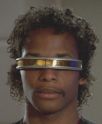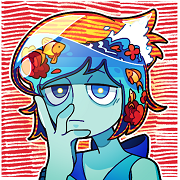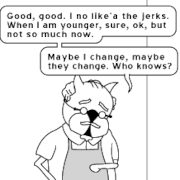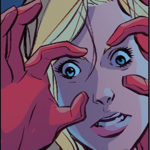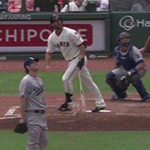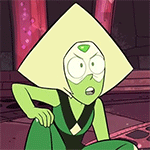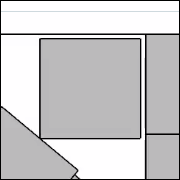|
Toxxupation posted:We're too late, Donna, he's...van gone. Also Van Gogh's mental illness is somehow putting the world in jeopardy. I feel like that would have been a plot point. Good stuff though.
|
|
|
|

|
| # ? May 29, 2024 21:33 |
|
Bicyclops posted:I think it's maybe important, with respect to Toxx, to say that it's alright to have an opinion on episodes that deal with issues of mental health without having directly experienced the subject matter. If anything that's the only realistic way to open this up to national dialog
|
|
|
|
Toxxupation posted:We're too late, Donna, he's...van gone. Vincent's never before mentioned and totally not historically accurate boyfriend cries in the corner of the TARDIS
|
|
|
|
The show is usually ok about this (or I don't catch it very often) but the bit at the start where the Doctor sees the painting and decides he has to time travel right now it's urgent made me laugh.
|
|
|
|
This is one of my favorite episodes of the show, but I understand why it didn't land for you. That was a really good review.Toxxupation posted:We're too late, Donna, he's...van gone. Hmm yes this is how it should have gone.
|
|
|
|
The Krayfiss is actually really great as a depression metaphor - an invisible monster.
|
|
|
|
Jerusalem posted:Including the giant invisible space chicken absolutely messed with the flow of the story, and felt like it was included because "we're a sci-fi show so there always has to be some kind of alien menace!" - I would have been perfectly happy if the "monster" they saw painted in the church had turned out to be just a representation of Van Gogh's struggles with his condition, and that his time with Amy and the Doctor helped (at least in the moment) so he ended up not painting it after all. It distracts from the story, even though it parallels Van Gogh's own struggle it could have just as easily done so without being "real", and that in fact might have helped the episode flow better. I've seen this episode two or three times before I rewatched it last night, and the one thing that surprised me the most was how much more prominent the monster was than I remember it being.
|
|
|
|
Yeah, this is another one of these Who episodes where in my mind the memory is basically a plot synopsis and then the entirety of the last act since that was where the real punch was. I sort of forgot the non-starter monster.
|
|
|
|
Tempo 119 posted:The show is usually ok about this (or I don't catch it very often) but the bit at the start where the Doctor sees the painting and decides he has to time travel right now it's urgent made me laugh. Equally, that the Doctor can get the exact day the painting was made, within a two or three day window, but couldn't just ask the curator the name of the church in the painting is pretty implausible. But, of course, if he could do that, he'd never have had to risk screwing up history.
|
|
|
|
Toxxupation posted:I don't like coldly, blatantly emotionally manipulative ones, and the last ten minutes of "Vincent" crossed over into the latter camp. That's how I felt, as well. Watching it, I remember thinking to myself something like, "wow, that is some maudlin bullshit." The greatest man who ever lived? I mean, it's not just on the nose, it's up the loving nostril. I tried watching this one again and it just felt like a slog, somehow worse than The Hungry Earth to me (which was just trite and empty), but not as insultingly bad as Cold Blood.
|
|
|
|
Noxville posted:I don't think that's exactly right but it's significantly closer than the 'Van Go' so beloved of Americans. I am a dutchman, of the dutch language with its love for hard Gs and odd THs trust me, there is no way to say his name in english without making it sound unnatural
|
|
|
|
Tempo 119 posted:The show is usually ok about this (or I don't catch it very often) but the bit at the start where the Doctor sees the painting and decides he has to time travel right now it's urgent made me laugh. It always makes me laugh when it happens. The one at the start of End of Time is even sillier.
|
|
|
|
Random Stranger posted:What's wrong with that? Using a character as a mouthpiece for boringly stated personal views in an out of place fashion is one of the grand traditions of terrible writing. It's also completely different from someone giving their own opinions on it. Another grand tradition of terrible writing is stating subjective opinions as objective facts, never bothering to back them up, and attempting to discredit anybody who disagrees with you because "everybody knows that doing this thing is bad/good, who needs explanations or reasons?" A terribly written post accusing doctor who of being terribly written/not having "artistic merit" because of the opinions on art which are expressed within it. You don't get why I might want to point that out to the dude?
|
|
|
|
DoctorWhat posted:The Krayfiss is actually really great as a depression metaphor - an invisible monster. Even more than that, an invisible monster that constantly bedevils Vincent and gets him in trouble with others for reasons he can't control and doesn't understand. Van Gogh was one of my sister's favorite artists (she always had better taste than me), so I went into this episode with very low expectations; I figured I knew enough about him that I'd spot some weird issue that would ruin it for me. But no, their depiction of him really was pretty good. Not perfect, but what is? I think having it not save him in the end was kind of a bold choice. They could have shown some of his later paintings and claimed those didn't exist before (see, we've always lived in the new reality, so we never knew a world without Wheat Field With Crows). So they delayed his suicide! Maybe it was actually aliens and didn't end up being suicide after all! Instead, he died nobly for his country and world! Go Team Doctor! But no. They kept it, and even bringing him into the future, even showing him that what he did mattered to people and that he'd eventually be vindicated, wasn't enough. Because depression isn't about the outside world, it's about what's inside your head, and nothing they could do could change that for him. He needed more than a quick trip with a couple of people he'd never see again to fix his problems. People often think of depression as being something that you should just be tough enough to soldier through, or that your friends can get you out of by cheering you up, but like an invisible chicken lizard from space, it's always there, waiting to wreak havoc in your life, and nobody knows it but you. And it doesn't know what it's doing, either; its path of destruction, no matter how personal it feels, is the inevitable and impartial consequence of hosed-up brain chemistry.
|
|
|
|
DeafNote posted:I am a dutchman, of the dutch language with its love for hard Gs and odd THs The solution is clearly to just teach everyone in the world Dutch.
|
|
|
|
Vonnegut Asterisk posted:Also Van Gogh's mental illness is somehow putting the world in jeopardy. I feel like that would have been a plot point. Good stuff though. During the course of the episode, they suddenly cut to a middle-class family huddled together, shaking with fear.
|
|
|
|
Jerusalem posted:During the course of the episode, they suddenly cut to a middle-class family huddled together, shaking with fear. I prefer the Varos model of working-class families making fun of the show as it goes.
|
|
|
|
thought this one was an A for sure. I am the wrongest.
|
|
|
|
Toxxupation posted:We're too late, Donna, he's...van gone. whoa WHOA who let RTD in here?
|
|
|
|
Toxxupation posted:That's not the issue. The issue is that, well, suicide is dark. It's dark in a way that Doctor Who can never be and probably shouldn't be. I disagree. It's not torture porn grim dark, it's an acknowledgement of something that happens in the real world. Who has shown murder, war, emotional loss. The 2005 series started with the ninth Doctor suffering PTSD from carrying out what some would see as a war crime. Even the Daleks, the amusing pepper pots of death, were a thinly veiled analogy for the Nazi forces that had still been fighting less than 20 years before.
|
|
|
|
Senor Tron posted:I disagree. It's not torture porn grim dark, it's an acknowledgement of something that happens in the real world. Also vampires of venice had two suicides The father explodes The alien mother feeds herself to her sons because shes so distraught
|
|
|
|
idonotlikepeas posted:They kept it, and even bringing him into the future, even showing him that what he did mattered to people and that he'd eventually be vindicated, wasn't enough. Because depression isn't about the outside world, it's about what's inside your head, and nothing they could do could change that for him. He needed more than a quick trip with a couple of people he'd never see again to fix his problems. I'm uncomfortable performing "hi, I'm a depressed person" to support my view, but I'll do it anyway because this is the E/N Doctor Who thread, right? My experience of severe depression was that my own valiant attempts to motivate myself out of it by making myself feel guilty about other people's feelings did not work. At all. Thinking about how much other people's lives would suck if I died didn't help keep me off the edge. What keeps any particular person off the edge is deeply personal; my answer actually turned out to come from being more self-centered rather than less. (I promised to buy myself some expensive jewelry if I was still alive by a given date.) A lot of people link to the Hyperbole and a Half depression comic because it is loving fantastic. She talks about what brought her out and it's equally personal. V&TheD captured my experience of helplessness and sorrow, so it works for me. I don't think any show can be completely "accurate about suicide" because there are a lot of different suicides, just as there are a lot of different childbirths.
|
|
|
|
Wow, I had forgotten just how overbearing that scene in the museum at the end was. I do think it's a beautiful episode, but man, Richard Curtis just couldn't resist himself could he?
|
|
|
|
Doctor Who "Vincent and the Doctor" Series 5, Episode 9 My research on these episodes before I start my posts is usually minimal, consisting of a quick trip to Wikipedia to check out the Writing and Production entries and picking out the bits that interest me most (such as the fortress of madness that was the Year of Specials' shooting schedule). If Wikipedia can be considered credible, and why on earth wouldn't it be, then one-time Who contributor Richard Curtis went way above and beyond in crafting the script for "Vincent and the Doctor." Already a self-proclaimed van Gogh aficionado, Curtis perused a 200-page biography on the man while writing, and then passed the script along to Moffat, the executive producer, the director, and even Smith and Gillan, editing and re-editing it with their feedback. This was a story with some heady subject matter and a lot of passion and care put into its creation, and for a lot of people, it landed - I saw plenty of adoration for this episode before, and those sentiments have re-emerged over the last several pages. I don't like "Vincent and the Doctor" very much. But because of the obvious care put into the story, and the feelings it's inspired in a lot of its viewers, I'm persuaded to take a softer-than-usual touch in laying out where I think it went wrong. It's the wrong parts that I'm mostly concerned with, because the ones that went right are really bloody obvious. Tony Curran puts in an unforgettable performance as van Gogh himself, not only looking the part down to the wrinkle but capturing what we know of the man's troubled but steadfast optimism. I skimmed his correspondences with his brother a while back, and van Gogh often came across as a man at once tortured by and resigned to his ever-percolating brain chemistry, snatching what beauty he could out of the world around him before his latest mood swing turned it all to poo poo again; he often wrote of love as the one true way to get closer to God and his art as his best way to express that love, often frustrated by his inability to express color and shape precisely as it appeared in his mind. Curran's performance makes it hard to tell at any given moment if he's going to slap you heartily on the back, burst into tears, or shiv you with his paintbrush, and that emotional instability is a decent enough representation of a man who, mostly bereft of either public or self-esteem, had only his art as the rudder navigating the uncertainties of his life. The scenes between him, the Doctor, and Amy are all lovely moments (especially with Amy, lent a bitter edge as their playful flirtation just hammers in how dead Rory happens to be at the moment), and one could argue that if any episode of Doctor Who should have diverted completely from the formula, this was the ideal candidate - I can imagine it as a soft, slow, PBS-esque comedy/drama about the life of van Gogh and how his circumstances influenced his art, and vice-versa. Funny, educational, and memorable. Enter the son of a bitching space chicken. The Krafayis is mostly glossed over in people's fonder recollections of "Vincent and the Doctor," but it's an intolerable addition that might be the worst "obligatory monster" since the Langoloyles in "Father's Day." Its design is ridiculous, its portrayal is a daring failure (save for that one hilarious bit at an over-enthusiastic Eleven wildly pitchforking thin air), and worst of all, it's to this episode's pacing what a dropped pipe wrench is to a high-speed fan. The first three-quarters of its runtime lurch wildly between slower-paced, philosophical conversations with Vincent and wildly running and shouting from the space chicken, and it's incongruous in all the worst ways; this is an episode split in two halves, and both of them are at war with each other. There's nothing that the Krafayis lends to this episode beyond obligatory action sequences and, in all fairness, an unusually subtle metaphor for Vincent's own depression - a blind, lumbering, destructive, pathetic monster slain by the instrument of Vincent's creativity. Even that latter part could have been done away with, though. It would've been worth having one less invisible chicken lizard in our lives. The Krafayis' screen-hogging means that Vincent's character has to be presented in truncated, disconnected snippets, which at times makes it feel like we're getting the Cliff's Notes version of one man's struggle with mental illness. Curran does his best with the material he's given, but the oddly rushed nature of Vincent's portrayal - the pantomime-esque rows with the townsfolk, Vincent's thirty-second breakdown on the bed and five-minute rebound, the repeated didactic lines from Smith and Gillan about the nature of depression - occasionally becomes difficult to swallow. The show's material is hamstrung by its format; the BBC never would have greenlit a Who episode without some kind of runny-shouty monster business, but it's all such a drag on what this one's actually about that it blunts the message Curtis was trying to get across. Curtis himself clearly understood that, which is why he has the Krafayis easel-shivved with fifteen minutes still on the clock. And, yes, on we go to the fourth act. Both Occ and I have stated repeatedly that emotive moments don't land with me. That's not just kayfabe meant to emphasize the whole yin/yang dynamic we've set up here; my reactions towards emotional media seem to be calibrated way differently than the norm. The last time I seriously bawled at a TV show was at an episode of Gumby when I was eight, and no, I don't remember why. I was a troubled, and troubling, child. What tends to make me get pissy at heartstring-tugging is that I often think it's a cheap, lazy shortcut to make a connection with the audience, as I often felt with Davies' run - it's the perceived insincerity that bugs me, not the weepy drama itself. For that reason, the final act of "Vincent and the Doctor" played quite a bit better with me than with Occ, because while it's overblown as a zeppelin, I think it was as earnest as can be, especially in light of the ridiculous amount of legwork Curtis put into this script. This is exactly the kind of sledgehammer-subtle climax that would play great with kids, and by the looks of this thread it looks like it appealed to a bunch of adults as well. Which isn't to say I liked it. Oh Lord, no. Most of it's to do with that song choice, which might be the single biggest misstep in the Who revival's entire soundtrack. Murray Gold was born for a moment like Vincent's visit to the Musée d'Orsay, and instead, for one of the only times in the whole series, he's passed up for the British rock band Athlete, a platinum-selling group that nevertheless sounds bland as Christian rock and turns the ending of "Vincent and the Doctor" into a second-rate episode of Scrubs. If you want to shunt off Gold for some big bombastic climax of Feelings, then for God's sake, at least trot out "Hoppipolla" or something else without comprehensible lyrics so I don't have to listen to some boy-band knockoff douche crooning about "cries and kisses" as Bill Nighy paints a halo over van Gogh's head. Nighy's speech didn't bother me quite so much, as his rhapsodizing over van Gogh and his legacy isn't without merit - the man remains one of the most beloved and accessible painters in history, posthumously or not, and Nighy's commentary about the difficult and laudable task of turning the pain of one's life into uplifting, inspirational art is a lovely, concise statement of what so often differentiates enduring art from plain old dirge - but the sappiness of that whole scene was already a little hard to take, and that drat song pushed it well over the edge. Curran at least plays his role to the hilt, and his red-eyed trembling at history's vindication of van Gogh is a treat to watch. And then we have the whole "suicide" issue. Oh, boy, not looking forward to this. I'm not going to dismiss Occupation's perspective on it, because Jesus Christ why the hell would I, but I don't agree that the end of "Vincent and the Doctor" is fundamentally at odds with Doctor Who. It's far weightier material than the show is used to pulling, absolutely, and the general tone of the episode works against it half the time, but its depiction of the inexorable nature of depression and seeming senselessness of suicide is, I think, a fair one, both palatable and valuable to the younger audience for which this program's intended. I like to go on about how a recurring theme of Who is that "the end is never the end," the optimistic belief that just because something dies or passes on doesn't make everything that led up to it pointless, and the same is applied to Vincent himself. The Doctor can kill as many space chickens as he wants, but the monsters inside van Gogh's head are beyond him; still, he tries to brighten what life van Gogh had left as best he can before moving on. It's a volatile subject, with a wide range of opinions that grow more and more tempestuous as you get people with more personal experience with the topic itself. I'm approaching it from a strictly intellectual angle, others approach it from personal and emotional ones, and all of them come away with different takes. The guideline for Doctor Who should, I think, be the same as you'd get from an actual Doctor - "first, do no harm," handle your subject matter however you like as long as the lessons you teach aren't false or actively harmful. The suicide angle follows this credo; for a lot of people, it does much better. I'm indifferent to it, Occ didn't like it at all, but we're just two assholes with an ever-growing pile of words behind us and our say isn't the final one. "Vincent and the Doctor" is one more example of why I'm glad I don't use letter grades. By any standards I would use, the episode's a dud. But under the hood, it shows a huge amount of passion, thoughtfulness, and care, and resonated with people in ways that I am fairly certain I am psychologically incapable of comprehending. Do you measure the intent, or the product? Do you judge the action, or the response? I'd prefer to just move on from it, remembering one of the episode's best scenes - the Doctor, Amy, and Vincent sprawled out on the grass, with Vincent (albeit ham-handedly, I'll never be able to shut off that inner critic) describing the variegated color of the sky until it turns into "Starry Night" before their eyes. That's the main purpose of art, to bridge the gap between one mind and another and, as it did for van Gogh himself, give us all a little light to follow in a dark and confusing world. From what I've read, I guess that makes "Vincent and the Doctor" art. Godawful rock music notwithstanding. Oxxidation fucked around with this message at 05:34 on Feb 5, 2015 |
|
|
|
Vincent and the Doctor is great, the Krayfiss is great, Bill Nighy is great, all of it is great.
|
|
|
|
Oxxidation posted:I'd prefer to just move on from it, remembering one of the episode's best scenes - the Doctor, Amy, and Vincent sprawled out on the grass, with Vincent (albeit ham-handedly, I'll never be able to shut off that inner critic) describing the variegated color of the sky until it turns into "Starry Night" before their eyes. That's the main purpose of art, to bridge the gap between one mind and another and, as it did for van Gogh himself, give us all a little light to follow in a dark and confusing world. From what I've read, I guess that makes "Vincent and the Doctor" art. Godawful rock music notwithstanding. That scene really is tremendous, that along with the shot of Amy sitting amongst the sunflowers really stand out to me. Oxxidation posted:It would've been worth having one less invisible chicken lizard in our lives. I love that Doctor Who is a show that makes lines like this possible 
|
|
|
|
Oxxidation posted:Godawful rock music notwithstanding. That was a thing I completely forgot about, like completely blocked it from my memory, and man was that overbearing and lame.
|
|
|
|
All this talk about suicide in Doctor Who and not one Waters Of Mars mention? I'm surprised.
|
|
|
|
DoctorWhat posted:Vincent and the Doctor is great, the Krayfiss is great, Bill Nighy is great, all of it is great. Even your review is great. That's just how great it is.
|
|
|
|
Jerusalem posted:Including the giant invisible space chicken absolutely messed with the flow of the story, and felt like it was included because "we're a sci-fi show so there always has to be some kind of alien menace!" - I would have been perfectly happy if the "monster" they saw painted in the church had turned out to be just a representation of Van Gogh's struggles with his condition, and that his time with Amy and the Doctor helped (at least in the moment) so he ended up not painting it after all. It distracts from the story, even though it parallels Van Gogh's own struggle it could have just as easily done so without being "real", and that in fact might have helped the episode flow better. Yup. The invisible space chicken had no place. Toxx's jokes, funny as they may be, just roll of my back though. It's a great episode and I love it.
|
|
|
|
Toxxupation posted:We're too late, Donna, he's...van gone. hahahaha
|
|
|
|
I may disagree with you on this episode, Occ (I loved it, and I also have personal experience with depression), but I think that was an excellent review, articulating very well the strengths and flaws of the episode. Although I definitely took the ending to mean that there's no magical cure for depression, which is a valuable thing for a kid's show to say.
|
|
|
|
Ahhhh, more ghost chicken squawking! Oh, very loud, quite intimidating! Listen here, you see-through turkey. You can try to take over a building, you can scare the local peasants. You can even be bad computer generated... stuff. But when you interfere with an artist, you interfere with humanity, and they have a protector, you hear. This painter? He's their starry right. You want something to squawk into? Try this!! *The Doctor throws Van Gogh's severed ear at the creature as that catchy loving Murray Gold song swells.*
|
|
|
|
It's still a really good episode, fight me.
|
|
|
|
Bicyclops posted:Ahhhh, more ghost chicken squawking! Oh, very loud, quite intimidating! Listen here, you see-through turkey. You can try to take over a building, you can scare the local peasants. You can even be bad computer generated... stuff. But when you interfere with an artist, you interfere with humanity, and they have a protector, you hear. This painter? He's their starry right. You want something to squawk into? Try this!! i could hear it 
|
|
|
|
Bicyclops posted:Ahhhh, more ghost chicken squawking! Oh, very loud, quite intimidating! Listen here, you see-through turkey. You can try to take over a building, you can scare the local peasants. You can even be bad computer generated... stuff. But when you interfere with an artist, you interfere with humanity, and they have a protector, you hear. This painter? He's their starry right. You want something to squawk into? Try this!! You're an evil man and you're going straight to Hell.
|
|
|
|
Maybe instead of taking him to a museum, they should have taken Vincent to a 27th century medical center to get his brain fixed.
|
|
|
|
Oxxidation posted:You're an evil man and you're going straight to Hell. Oxxidation posted:straight to Hell. INTO THE VOID
|
|
|
|
Bicyclops posted:Ahhhh, more ghost chicken squawking! Oh, very loud, quite intimidating! Listen here, you see-through turkey. You can try to take over a building, you can scare the local peasants. You can even be bad computer generated... stuff. But when you interfere with an artist, you interfere with humanity, and they have a protector, you hear. This painter? He's their starry right. You want something to squawk into? Try this!! 
|
|
|
|

|
| # ? May 29, 2024 21:33 |
|
Oxxidation posted:You're an evil man and you're going straight to Hell. At last, something everyone can agree on!
|
|
|












